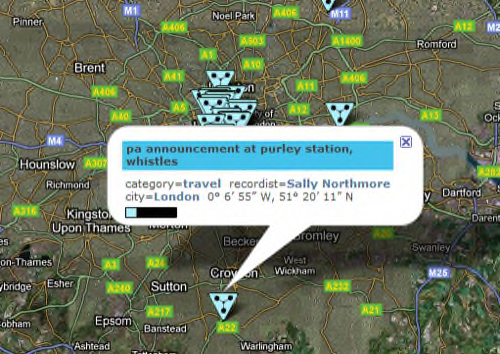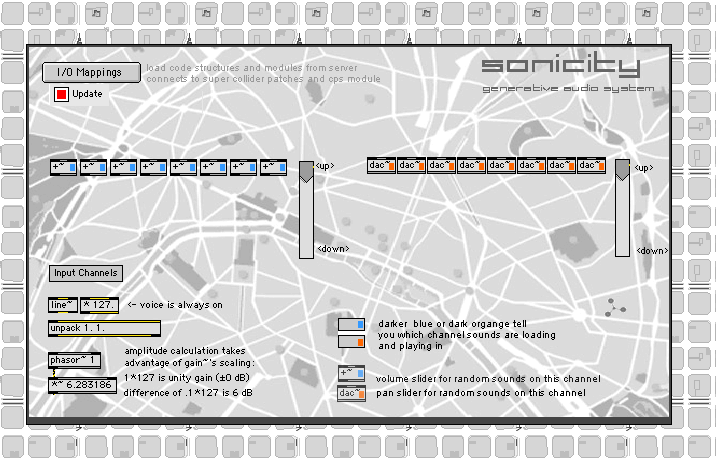The British painter and video artist “Stanza,” has spent a couple of decades traveling around the world. Every place he’d stop, he’d grab audio tape (then digital recordings) of the sounds of that place. In 2000, he started posting sound-maps online and in 2004 he made the database available. Now, Soundcities is an extensive, open-source sound and mapping site that users can freely take from and contribute to. There are even on-site mixing decks to allow anyone with a computer to remix the world.

I first came across the site only today, when an old friend, the perennial exile activist and writer Sokari Ekine, tweeted a blog post on the site, which she’d been using as an antidote to living in Florida. (My words, not hers.)

“I started to wish I was back on Kilburn High Road recording the late night rats in the garbage from Nandos, the drunks coming out of the pubs, sirens all day long, endless chatter and traffic, kids playing – well screaming in the park, couples fighting, youths dealing, singing beer drinking out of town football fans from strange places like Wigan and Stoke City, and my own music trying to silence all these external noises and the neighbour shouting and banging on my wall trying to silence me.”
The spread of cities represented in this first open-source, crowdsourced database of found city-sounds and maps is remarkable. The listener can travel from Tokyo, Japan to Belo Horizonte in Brazil, from Granada, Spain to Bamako in Mali. The maps lean toward Europe and Latin America with an emphasis on larger population areas. Hopefully, with the crowdsourcing element fully engaged it will get more from Africa and from rural areas.
You can also search for cities based on quality keywords, like “beat,” “birds,” “churches,” “industrial” and “weather.”
Sonicity
Sonicity is an on-site sound mixer that allows the listener to pluck and mix cities, individual sounds, pretty much anything in the database.

Users have also utilized the database to create music. Stanza has composed a musical “world tour” and released it as an MP3 download called Soundcities CD.
The experience and possibilities inherent in the project are pretty intuitive, but here’s Stanza’s take on the experiment.
“(S)ounds…give clues to the emotional and responsive way we interact with our cities. Cities all have specific identities, and found sound can give us clues to the people that inhabit these spaces, as well as provoking us and stimulating our senses in a musical way. I am interested in the sounds of specific places, and how the sounds reflect this identity and re-imposes characteristics back onto the location or environment.”
Stanza’s experiments may have been among the first, but are not the only. Among the others are the British Library’s UKSOUNDMAP and the BBC’s Save Our Sounds project.
What’s your experience with capturing and interpreting sounds online? What sources and tools do you use? Where do you post the results? Let us know in the comments.
***
Other sources: Intersections, Weird Vibrations, Oso





















